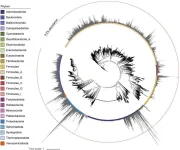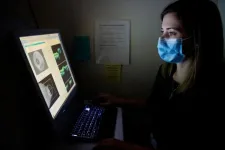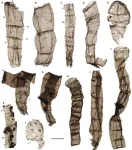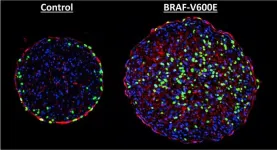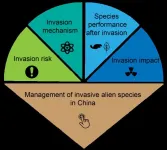(Press-News.org) A new study suggests that heatwaves are exacerbating socioeconomic inequalities in Brazil, with people who are female, elderly, Black, Brown, or who have lower educational levels potentially facing greater risk of death during heatwaves. Djacinto Monteiro dos Santos of Universidade Federal do Rio de Janeiro, Brazil, and colleagues present these findings in the open-access journal PLOS ONE on January 24, 2024.
As climate change progresses, heatwaves are becoming hotter, longer, and more frequent in many regions worldwide, including in Brazil. Heatwaves can increase the risk of dying from a chronic condition, such as heart disease or pneumonia. Prior research has linked heatwaves in Brazil to higher risk of death. However, few studies have explored the role played by socioeconomic and demographic factors in heat-related deaths in Brazil.
To help clarify, Monteiro dos Santos and colleagues analyzed death rates during heatwaves between 2000 and 2018 in 14 major urban areas of Brazil, representing more than one third of the national population.
In line with prior research, they found that Brazil experienced three to 11 heatwaves per year in the 2010s, up from zero to three per year in the 1970s. Between 2000 and 2018, 48,075 deaths could be attributed to heatwaves, with the most frequent causes of death being circulatory diseases, respiratory diseases, and cancer.
Heatwave-related death rates varied between geographical regions within Brazil, which the researchers linked to known North-South inequalities pertaining to socioeconomic and health indicators, including life expectancy. Heatwave-related death rates were higher among people who were female, elderly, Black, Brown, or who had lower educational levels.
The researchers also found that a technique known as event-based surveillance analysis—which looks for emerging signals in social media rumors or other sources—would have been unsuccessful in providing early warning of high rates of heatwave-related deaths, suggesting that extreme heatwaves are neglected disasters in Brazil.
These findings could help inform efforts to reduce deaths during future heatwaves. Further research could address some of this study’s limitations by covering a longer time period, incorporating more socioeconomic indicators, and using data from more than one weather station for each urban area.
The authors add: “Heatwaves were responsible for more than 48,000 deaths in urban areas in Brazil. Women, black and brown people, the elderly and those with a lower level of education are the most affected, reinforcing how human-induced climate change has exacerbated the socioeconomic inequalities in the country.”
#####
In your coverage please use this URL to provide access to the freely available article in PLOS ONE: https://journals.plos.org/plosone/article?id=10.1371/journal.pone.0295766
Citation: Monteiro dos Santos D, Libonati R, Garcia BN, Geirinhas JL, Salvi BB, Lima e Silva E, et al. (2024) Twenty-first-century demographic and social inequalities of heat-related deaths in Brazilian urban areas. PLoS ONE 19(1): e0295766. https://doi.org/10.1371/journal.pone.0295766
Author Countries: Brazil, Portugal
Funding: D.M.S. acknowledges the support of FIOCRUZ [grant VPPCB-003-FIO-19], FAPERJ [grant E-26/205.890/2022]. RL was supported by FAPERJ [grant E-26/200.329/2023 and E-26/210.078/2023] and CNPQ [grant 311487/2021-1]. A.R. and R.M.T. were supported by Fundação para a Ciência e a Tecnologia, I.P./ MCTES through national funds (PIDDAC)” –UIDB/50019/2020 and also by Project ROADMAP (JPIOCEANS/0001/2019). B.N.G. was supported by CNPQ [grant 161075/2021-5]. J.L.G. acknowledges the support of FCT (Fundação para a Ciência e Tecnologia) for the PhD Grant 2020.05198.BD. HG was supported by CNPQ [grant 317617/2021-4] and International Joint Laboratory “Sentinela” (Fiocruz, UnB, IRD) (grant IRD LMI-Sentinela). The funders had no role in study design, data collection and analysis, decision to publish, or preparation of the manuscript.
END
Risk of death during heatwaves in Brazil linked to socioeconomic factors
48,075 deaths in 2000-2018 could be attributed to the increasingly frequent heatwaves in Brazil
2024-01-24
ELSE PRESS RELEASES FROM THIS DATE:
DNA from preserved feces reveals ancient Japanese gut environment
2024-01-24
DNA from ancient feces can offer archaeologists new clues about the life and health of Japanese people who lived thousands of years ago, according to a study published January 24, 2024 in the open-access journal PLOS ONE by Luca Nishimura and Ituro Inoue from the National Institute of Genetics, Japan, Hiroki Oota from The University of Tokyo, Mayumi Ajimoto from Wakasa History Museum, and colleagues.
Fossilized feces, also known as coprolites, can preserve an array of genetic material from the digestive tracts ...
A virus that infected the first animals hundreds of millions of years ago has become essential for the development of the embryo
2024-01-24
At least 8% of the human genome is genetic material from viruses. It was considered ‘junk DNA’ until recently, but its role in human development is now known to be essential
Researchers at the Spanish National Cancer Research Centre (CNIO) describe for the first time the role of these viruses in a key process in development, when cells become pluripotent few hours after fertilization
The finding, published in Science Advances, is relevant for regenerative medicine and for the creation of artificial ...
City of Hope, TGen researchers develop machine-learning tool to detect cancer earlier via liquid biopsy
2024-01-24
LOS ANGELES — Researchers at City of Hope, one of the largest cancer research and treatment organizations in the United States, and Translational Genomics Research Institute (TGen), a precision medicine research organization that is part of City of Hope, have developed and tested an innovative machine-learning approach that could one day enable the earlier detection of cancer in patients by using smaller blood draws. The study was published today in the journal Science Translational Medicine.
“A huge body of evidence shows that cancer caught at later stages kills people. This new technology gets us closer to a world ...
Gene behind heart defects in Down syndrome identified
2024-01-24
Francis Crick Institute press release
Under strict embargo: 19:00hrs GMT 24 January 2024
Peer reviewed
Experimental study
Animals
Gene behind heart defects in Down syndrome identified
Researchers at the Francis Crick Institute and UCL have identified a gene that causes heart defects in Down syndrome, a condition that results from an additional copy of chromosome 21.
Reducing the overactivity of this gene partially reversed these defects in mice, setting the scene for potential future therapies for heart conditions in people with Down syndrome.
Down syndrome ...
Moving humanoid robots outside research labs: the evolution of the iCub3 avatar system
2024-01-24
Genova (Italy), 24 January 2024 - Over the past four years, the research team at the Artificial and Mechanical Intelligence (AMI) lab at the Istituto Italiano di Tecnologia (IIT-Italian Institute of Technology) in Genova (Italy) has developed advanced avatar technologies, known as the iCub3 system, in continuous testing with real-world scenarios. The system was utilized to enable a human operator to remotely visit locations 300 km away, to entertain the public at events and television appearances, and ...
Retinal imaging and genetics data used to predict future disease risk
2024-01-24
Mass Eye and Ear physician-researchers show that retinal imaging can help predict a person’s risk of developing ocular, neuropsychiatric, cardiac, metabolic, and pulmonary diseases.
The team also identified genetic loci associated with retinal thinning, which could help develop personalized treatment plans and future therapies for eye diseases such as glaucoma and macular degeneration.
The retina is said to provide a window into a person’s systemic health. In a new study published January 24th in Science Translational Medicine, physician-researchers from Mass ...
North China fossils show eukaryotes first acquired multicellularity 1.63 billion years ago
2024-01-24
In a study published in Science Advances on Jan. 24, researchers led by Prof. ZHU Maoyan from the Nanjing Institute of Geology and Palaeontology of the Chinese Academy of Sciences reported their recent discovery of 1.63-billion-year-old multicellular fossils from North China.
These exquisitely preserved microfossils are currently considered the oldest record of multicellular eukaryotes. This study is another breakthrough after the researchers’ earlier discovery of decimeter-sized eukaryotic fossils in the Yanshan area ...
Harnessing skin cancer genes to heal hearts
2024-01-24
DURHAM, N.C. – Biomedical engineers at Duke University have demonstrated that one of the most dangerous mutations found in skin cancers might moonlight as a pathway to mending a broken heart.
The genetic mutation in the protein BRAF, a part of the MAPK signaling pathway that can promote cell division, is one of the most common and most aggressive found in melanoma patients. In a new study, researchers show that introducing this mutation to rat heart tissue grown in a laboratory can induce growth.
Repairing ...
Special Feature calls attention to biological invasion research in China
2024-01-24
This month, the Ecological Society of America spotlights the challenge posed by invasive alien species in China with the release of a Special Feature, “Management of Biological Invasions in China,” in the latest issue of its journal Ecological Applications.
Accelerating rates of biological invasion have led to growing concerns about the destructive impacts of invasive alien species, or IAS, on the environment and human societies. This is especially true in China, which has witnessed a surge in ...
Researchers add a ‘twist’ to classical material design
2024-01-24
Researchers with the Department of Energy’s SLAC National Accelerator Laboratory, Stanford University and the DOE's Lawrence Berkeley National Laboratory (LBNL) grew a twisted multilayer crystal structure for the first time and measured the structure’s key properties. The twisted structure could help researchers develop next-generation materials for solar cells, quantum computers, lasers and other devices.
“This structure is something that we have not seen before – it was a huge surprise to me,” said Yi Cui, a professor at Stanford and SLAC and paper co-author. “A new quantum electronic property could appear ...
LAST 30 PRESS RELEASES:
Why conversation is more like a dance than an exchange of words
With Evo 2, AI can model and design the genetic code for all domains of life
Discovery of why only some early tumors survive could help catch and treat cancer at very earliest stages
Study reveals how gut bacteria and diet can reprogram fat to burn more energy
Mayo Clinic researchers link Parkinson's-related protein to faster Alzheimer's progression in women
Trends in metabolic and bariatric surgery use during the GLP-1 receptor agonist era
Loneliness, anxiety symptoms, depressive symptoms, and suicidal ideation in the all of us dataset
A decision-support system to personalize antidepressant treatment in major depressive disorder
Thunderstorms don’t just appear out of thin air - scientists' key finding to improve forecasting
Automated CT scan analysis could fast-track clinical assessments
New UNC Charlotte study reveals how just three molecules can launch gene-silencing condensates, organizing the epigenome and controlling stem cell differentiation
Oldest known bony fish fossils uncover early vertebrate evolution
High‑performance all‑solid‑state magnesium-air rechargeable battery enabled by metal-free nanoporous graphene
Improving data science education using interest‑matched examples and hands‑on data exercises
Sparkling water helps keep minds sharp during long esports sessions
Drone LiDAR surveys of abandoned roads reveal long-term debris supply driving debris-flow hazards
UGA Bioinformatics doctoral student selected for AIBS and SURA public policy fellowship
Gut microbiome connected with heart disease precursor
Nitrous oxide, a product of fertilizer use, may harm some soil bacteria
FAU lands $4.5M US Air Force T-1A Jayhawk flight simulator
SimTac: A physics-based simulator for vision-based tactile sensing with biomorphic structures
Preparing students to deal with ‘reality shock’ in the workplace
Researchers develop beating, 3D-printed heart model for surgical practice
Black soldier fly larvae show promise for safe organic waste removal
People with COPD commonly misuse medications
How periodontitis-linked bacteria accelerate osteoporosis-like bone loss through the gut
Understanding how cells take up and use isolated ‘powerhouses’ to restore energy function
Ten-point plan to deliver climate education unveiled by experts
Team led by UC San Diego researchers selected for prestigious global cancer prize
Study: Reported crop yield gains from breeding may be overstated
[Press-News.org] Risk of death during heatwaves in Brazil linked to socioeconomic factors48,075 deaths in 2000-2018 could be attributed to the increasingly frequent heatwaves in Brazil



